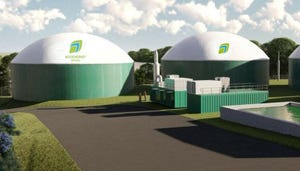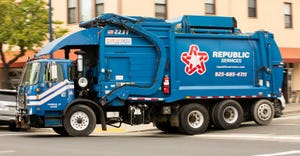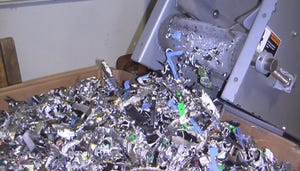Small Hauler Makes It Big In Texas
January 1, 1996
WORLD WASTES STAFF
When a small private hauler first opens its doors, the owners can depend on two things: the competition will be stiff and the risks unrelenting. With some tenacity, however, small businesses gradually can make a name for themselves.
For example, since Resource Marketing Inc. in Fort Worth, Texas, joined the waste industry in 1990, it has grown from two employees to 68; from one truck, to a fleet of 40; and from one small contract to remove sewage sludge, to four major disposal contracts with the cities of Dallas and Fort Worth, Texas.
These contracts include curbside recycling for 70,000 residences in Fort Worth; curbside garbage, recycling and brush/bulk collection for 31,500 residences in Dallas; and curbside recycling collection for 8,500 homes in the Fort Worth suburbs of Forest Hill and Mansfield. In addition, a contract to handle commercial garbage collection for the Dallas-Fort Worth Airport Authority currently is up for mandatory renewal.
"We couldn't have done it without the help of [many] people," said CEO and founder Earl Burrell. "[Success] never [depends upon] one thing, but a combination of things that come together, such as hiring the right people and forming strong partnerships."
Opportunity Knocks Before 1990, Burrell owned a construction firm in the Dallas-Fort Worth area. Undaunted by his lack of experience in waste management, Burrell was attracted by the growing number of opportunities in the industry, including recycling.
The company's first job entailed removing more than 1 million cubic yards of sewage sludge from the drying beds at Village Creek Waste Water Treatment Plant in Fort Worth. Next, Resource Marketing received a contract from Waste Management Inc., Oak Brook, Ill., to market composted wood chips from Fort Worth.
Resource Marketing's big break came in 1991, according to Burrell, when Waste Management invited the company to participate as a minority partner in a curbside recycling program in the city of Fort Worth. Mandated by the Texas state legislature to reduce the waste stream by 40 percent by the year 2000, the city approved a recycling program conceived by Citizens for the Environment, a coalition of Fort Worth residents focused on recycling.
Under the program, 63,000 Fort Worth residences were supplied with bins in which to deposit recyclable items such as paper, aluminum and glass. To encourage participation, residents were charged no additional fee for recyclables collection. Instead, Resource Marketing and Waste Management financed the program by re-marketing items such as newspapers to companies like Weyerhaeuser Recycling Co., Tacoma, Wash.
At first, participation among Fort Worth residents was low, but it gained momentum through a public education campaign featuring TV and radio public service announcements. Today, the participation rate reportedly is 80 percent among Fort Worth's 135,000 residences.
The success of the Fort Worth program provided Resource Marketing with the experience and confidence to propose residential garbage and recycling collection programs to the cities of Dallas, Mansfield and Forest Hill, and a commercial garbage/ recycling collection program for the Dallas-Fort Worth Airport Authority, according to Burrell.
Resource Marketing's most recent challenge is managing its contract with the City of Dallas, which it secured last year. Under a blazing hot Texas sun that can lead to working temperatures of 120 degrees F, Resource Marketing operators reportedly make more than 1,200 stops in a 10-hour day, picking up garbage, recyclables and brush/bulky wastes.
Under the Dallas contract, Resource Marketing charges a flat fee of approximately $7 per month for twice-a-week curbside collection. The service includes collection of an unlimited number of garbage bags and recyclable items. Unlike the Fort Worth program where residents place recyclables in 10-gallon bins provided by Resource Marketing, Dallas residents place their recyclable items in 10-gallon blue bags available through nearby retailers.
To service Dallas and its other contracts, Resource Marketing relies on a fleet of 40 trucks, including 20 Mack Mid-Liner vehicles, 12 International medium-duty trucks, two Mack heavy-duty MD models and seven Ford and GMC pick-up trucks.
The Mid-Liners are used primarily for residential garbage and recycling collection under the Dallas contract. The medium-duty vehicles are equipped with Renault V.I. E3-220 bhp engines and Dempster, 20-yard, rear-loading body. The company strives for low downtime and for fuel mileage ranging between seven to eight miles per gallon, based on 1,000 to 1,200 residential stops per day, according to Thomas Hemphill, the company's maintenance supervisor.
Changes On The Horizon Although residents in both Dallas and Fort Worth currently pay a flat fee for collection, Burrell believes that will change within the next five years. Eventually, the cities and the surrounding communities will likely legislate weight-based collection to accommodate dwindling landfill space, he said.
Two area landfills, owned by Waste Management and the City of Dallas, will likely have capacity for at least 20 years. However, within the next several years, many landfills in the Dallas-Fort Worth metro area will close (see table on page 28), including the Laidlaw landfill in nearby Johnson County and Waste Management's landfill on the east side of Fort Worth.
"As landfill and tipping fees continue to escalate, there's no doubt that Dallas, Fort Worth and its suburban neighbors will have to pass the rising costs on to residents," Burrell said.
Meanwhile, the use of transfer stations in the Dallas-Fort Worth area will continue to rise. As nearby landfills fill up, waste management companies must haul to landfills that are increasingly farther away. As such, smaller, more fuel-efficient trucks will be required to haul refuse to the transfer stations, where larger trucks will collect and haul the waste to distant landfills.
Thanks To The Team While Burrell attributes Resource Marketing's success to many things, one critical element is hiring the right people.
"One of the most important lessons [I've] learned is the value of surrounding yourself with good people," he said. "Hiring people who are excited about working with you, who are dedicated, efficient with their time and who realize the opportunities before them, has been a critical element to the success of our business."
Although rapid growth can make effective hiring difficult, Burrell believes it's important to take your time and do it right. In the past year, he has worked to identify individuals inside and outside the industry who can help him manage more effectively. Several employees have been important additions to the management team, including Rickey Brown, general manager of administration; Leonard Stewart, director of operations; Margill Guerra, safety manager; and Thomas Hemphill.
Finding the right people to work in the refuse industry, however, isn't always easy. A never-ending source of frustration for many refuse business owners is attracting quality drivers. "Even though we have a lot of opportunities for growth and advancement, we still have a problem finding competent refuse operators," Burrell said.
Despite this, Burrell is determined to push forward with plans to expand his company's services in other markets throughout the Southwest. Within the next five to 10 years, he foresees making the company public to finance future expansion plans. Until then, he remains focused on taking care of business.
"The secret to our success is very simple," Burrell said. "It's giving your customers what they want. All we have to sell in this business is service. If we can provide exceptional service at a good price, we'll continue to enjoy success for many years to come."
You May Also Like


